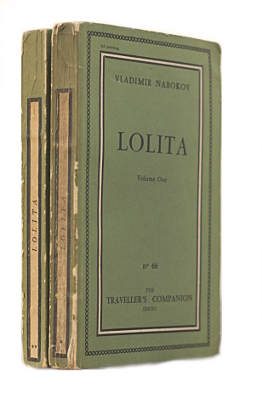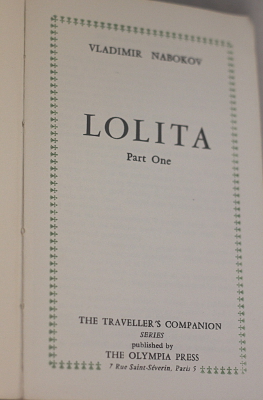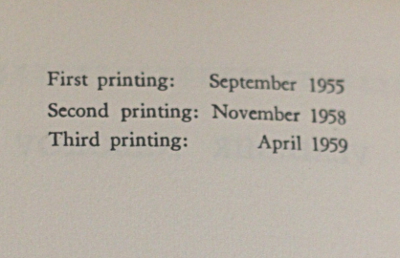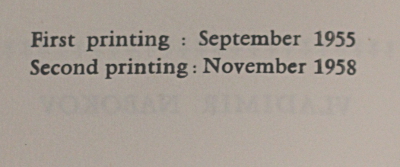Title: Lolita (2 vols)
Author: Vladimir Nabokov
Publisher: The Traveller’s Companion Series, Olympia Press. 1st edition. Vol I is the 3rd printing (1959), and Vol II is the 2nd printing (1958).
Condition: Paperback. Very good. Slight wear to cover. Some tanning on Vol I. A mixed set from 2 different printings. Covers same as the original 1st edition, 1st printing.
About the edition:
This 2-volume set is special because it was printed by Olympia Press, the original French publishers of Lolita. Here’s a brief publishing history of the book, from Wikipedia:
Nabokov finished Lolita on 6 December 1953, five years after starting it. Because of its subject matter, Nabokov intended to publish it pseudonymously (although the anagrammatic character Vivian Darkbloom would tip off the alert reader). The manuscript was turned down, with more or less regret, by Viking, Simon & Schuster, New Directions, Farrar, Straus, and Doubleday. After these refusals and warnings, he finally resorted to publication in France. Via his translator Doussia Ergaz, it reached Maurice Girodias of Olympia Press, “three quarters of [whose] list was pornographic trash”. Underinformed about Olympia, overlooking hints of Girodias’s approval of the conduct of a protagonist Girodias presumed was based on the author, and despite warnings from Morris Bishop, his friend at Cornell, Nabokov signed a contract with Olympia Press for publication of the book, to come out under his own name.
Lolita was published in September 1955, as a pair of green paperbacks “swarming with typographical errors”. Although the first printing of 5,000 copies sold out,[citation needed] there were no substantial reviews. Eventually, at the very end of 1955, Graham Greene, in the (London) Sunday Times, called it one of the three best books of 1955. This statement provoked a response from the (London) Sunday Express, whose editor John Gordon called it “the filthiest book I have ever read” and “sheer unrestrained pornography.” British Customs officers were then instructed by a panicked Home Office to seize all copies entering the United Kingdom.[citation needed] In December 1956, France followed suit, and the Minister of the Interior banned Lolita; the ban lasted for two years. Its eventual British publication by Weidenfeld & Nicolson caused a scandal that contributed to the end of the political career of one of the publishers, Nigel Nicolson.
The novel then appeared in Danish and Dutch translations (two editions of a Swedish translation were withdrawn at the author’s request).
Despite initial trepidation, there was no official response in the U.S., and the first American edition was issued by G.P. Putnam’s Sons in August 1958. The book was into a third printing within days and became the first since Gone with the Wind to sell 100,000 copies in its first three weeks.
About the book (from Wikipedia):
Lolita is a novel by Vladimir Nabokov, written in English and published in 1955 in Paris and 1958 in New York. It was later translated by its Russian-native author into Russian. The novel is notable for its controversial subject: the protagonist and unreliable narrator, a 37-38 year old literature professor Humbert Humbert, is obsessed with the 12-year-old Dolores Haze, with whom he becomes sexually involved after he becomes her stepfather. “Lolita” is his private nickname for Dolores.
After its publication, Lolita attained a classic status, becoming one of the best-known and most controversial examples of 20th century literature. The name “Lolita” has entered pop culture to describe a sexually precocious girl. The novel was adapted to film by Stanley Kubrick in 1962, and again in 1997 by Adrian Lyne. It has also been adapted several times for stage and has been the subject of two operas, two ballets, and an acclaimed but failed Broadway musical.
Lolita is included on Time’s List of the 100 Best Novels in English-language from 1923 to 2005. It is fourth on the Modern Library’s 1998 list of the 100 Best Novels of the 20th century. It was also included in The 100 Best Books of All Time, compiled in 2002 by the Norwegian Book Club.





